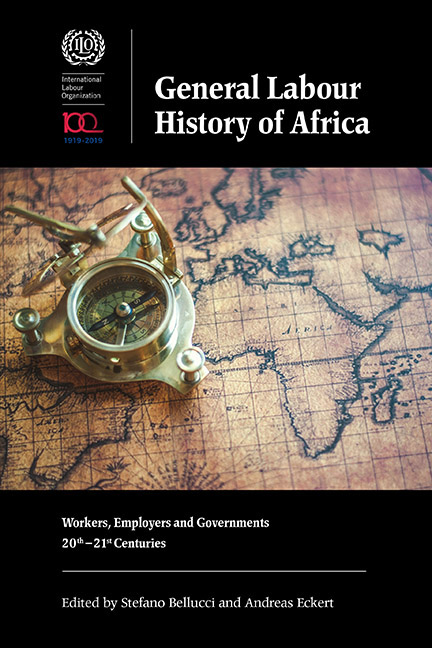Book contents
- Frontmatter
- Contents
- List of Maps and Figures
- List of Tables
- Notes on Contributors
- Foreword
- Acknowledgements
- The ‘Labour Question’ in Africanist Historiography
- Part I Free and Unfree Labour
- Part II Key Sectors
- 4 Agriculture
- 5 Mining
- 6 Industry and Manufacturing
- 7 Transport
- Part III International Dimensions and Mobility
- Part IV Varieties of Work
- Part V Entrepreneurs and Self-Employment
- Part VI The State, Unions and Welfare
- Part VII Conclusions
- Select Bibliography
- Index
6 - Industry and Manufacturing
from Part II - Key Sectors
Published online by Cambridge University Press: 21 September 2019
- Frontmatter
- Contents
- List of Maps and Figures
- List of Tables
- Notes on Contributors
- Foreword
- Acknowledgements
- The ‘Labour Question’ in Africanist Historiography
- Part I Free and Unfree Labour
- Part II Key Sectors
- 4 Agriculture
- 5 Mining
- 6 Industry and Manufacturing
- 7 Transport
- Part III International Dimensions and Mobility
- Part IV Varieties of Work
- Part V Entrepreneurs and Self-Employment
- Part VI The State, Unions and Welfare
- Part VII Conclusions
- Select Bibliography
- Index
Summary
The 2010s have seen abundant predictions that African economies may soon industrialize on a large scale. Leading economists such as Justin Lin identify low wages and emerging infrastructures as important locational advantages for African nations to benefit from ‘flying geese’ effects, which will come in the form of industrial relocations from middle-income countries such as China, India, Brazil and Russia. Then again, the assumption that now it is ‘Africa's turn to industrialize’ is not a novelty in the continent's history. Indeed, large-scale industrialization projects as a key to a better future have been central to African politics throughout the twentieth century. At the same time, African political initiatives have often required backing from labour and trade unions, and, in the medium term, have had to deliver on promises to improve working and living conditions if postcolonial administrations wanted to stay in power. The impact of such domestic initiatives on labour histories in manufacturing and industry has often been coupled with push and pull factors framed by uneven and multifarious global, transnational and regional political and economic processes.
This chapter maps and analyses the links between such internal and external industrial policies and practices, and the labour histories of wage workers in African manufacturing industries. The aim is to outline a ‘history of globalized work’ for African manufacturing and industry since around 1900 rather than to elaborate a ‘universal history of work’ that introduces microhistories of the lives and times of individual trade unionists or shop floor workers in a given number of African manufacturing locations.
The following gives an overview of the various labour histories that have emerged across manufacturing industries in African colonies and nations since around 1900. The first section takes stock of export substitution industries linked with agriculture as well as of early import substitution industries before the Second World War. The second section considers the continent-wide turn towards import substitution under wartime production and under colonial and postcolonial development policies before the 1970s. The third section focuses on changes to manufacturing workers’ histories triggered by the non-aligned movement's policies and the many structural adjustment programmes since the 1980s. The conclusion discusses the contribution of historiographies of African industrial labour to the future of industrial development policies in Africa.
- Type
- Chapter
- Information
- General Labour History of AfricaWorkers, Employers and Governments, 20th-21st Centuries, pp. 177 - 194Publisher: Boydell & BrewerPrint publication year: 2019



